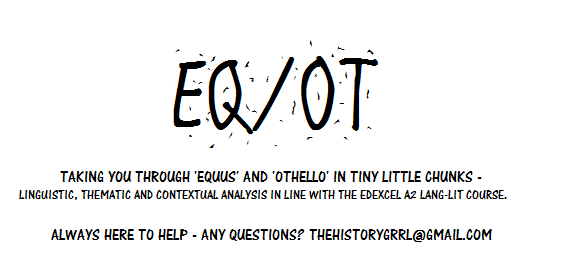 Othello
Othello, by William Shakespeare, is a traditional tragedy telling the story of a Moorish (black) general, Othello, of the Venician army, who defies convention when he woos and marries the "fair" (white) Desdemona, daughter of a Venetian dignitary. Her father is ruffled by this, and, upon learning she married Othello of her own free will, warns him of her potential deception later in the marriage.
Othello is then sent to defend the Venetian colony of Cyprus from the Turks; Desdemona goes too, in the care of Iago, Othello's standard barer.
Iago reveals himself to be grossly jealous of Othello for his status, and to be angered by the fact that he was not promoted to Lieutenant, with a young Florentine, Cassio, receiving this honour in his place; thus begins his plan for vengeance.
He provokes a 'friend', Roderigo, into starting a drunken brawl with Cassio, who fights and is disgraced. Cassio turns to Desdemona for help; she promises to do all she can to get him back in Othello's favour.
Iago uses this to persuade Othello that Desdemona is in love with, and committing adultery with, Cassio - proof of which is seen when Desdemona's handkerchief is found in Cassio's possession (when, truthfully, Iago placed it there).
Reluctantly, Othello agrees that Desdemona must surely be a whore, and breaks down, allowing Iago to point him towards revenge. He asks Iago to kill Cassio; Iago stabs Roderigo in the fray, with Cassio surviving. Othello then turns his sights on Desdemona, strangling her in her bed, but insisting too that she prays first - proving that he has not stopped loving her.
Emilia (Iago's wife and Desdemona's maid) comes to tell Othello about the brawl and Roderigo's death, instead finding him in the process of killing Desdemona. She calls for help, and Venetian senators arrive, eventually unravelling Iago's plot thanks to her quick wit and evidence.
Iago kills her for this, and is taken away, presumably to be tortured.
Othello commits suicide, taking justice into his own hands and going to join his wife.
Cassio is left as General.
Synopsis (c) TheHistoryGrrl 2010
Themes are woven throughout the synopsis
For a more detailed synopsis, see
wikipedia.
